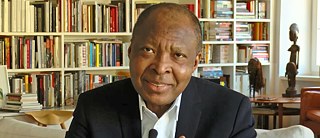Obituary on Okwui Enwezor
The Goethe-Institut mourns the death of Okwui Enwezor

The employees of the Goethe-Institut were shocked to learn that Okwui Enwezor died on 15 March in Munich after his serious illness. With his writings and exhibitions, he made a decisive contribution to the foundation of the global discourse on art. The regular collaboration with the Goethe-Institut, too, was marked by the great visions, the inexhaustible knowledge and the incorruptible critical eye, the professional precision and the human warmth of his impressive personality.
If the global postcolonial view of art and art theory has become a matter of course for the Goethe-Institut and its partners all over the world today, Okwui Enwezor, born in Calabar/Nigeria in 1963, certainly played a decisive role in this. In 1993, together with Salah Hassan and Chika Okeke-Agulu, he founded the magazine Nka, which to this day is one of the leading magazines for critical discourse on contemporary African art. Okwui Enwezor gained an international reputation as curator as Artistic Director of the 2nd Johannesburg Biennale in 1997/98 and then as curator of the exhibition "The Short Century" at the Museum Villa Stuck in Munich in 2001, which has lastingly changed our view of art in Africa since 1945.
The first intensive collaboration with the Goethe-Institut took place when Okwui Enwezor was Artistic Director of documenta 11 from 1998 to 2002 and conceived the exhibition in Kassel as the last of five international platforms. The 4th platform “Under Siege: Four African Cities” took place in March 2002 at the Goethe-Institut in Lagos. It asked about forms of modernity outside the reactive alternatives to the West, about modernities that emerge from postcolonial stories and global phenomena.
When Okwui Enwezor was appointed director of the Haus der Kunst in Munich in 2011, he was already well acquainted with the work of the Goethe-Institut. In the following years, the conceptual proximity and geographical vicinity to the Goethe-Institut's headquarters led to a regular and trusting collaboration. As early as mid-2012, the Goethe-Institut cooperated on the exhibition “Image Counter Image” at the Haus der Kunst, which presented artistic positions that critically deal with the portrayal of violent conflicts in the media. At the end of 2013, Okwui Enwezor was the keynote speaker at the “Crossing Archives” conference on colonial imagery and postcolonial archives, conceived by Marc-André Schmachtel at the Goethe-Institut in Lagos and his partners.
In 2013, the “Goethe-Institut Fellowship” for Postdocs at Haus der Kunst was established, awarded for one year at a time. Johannes Ebert, Secretary General of the Goethe-Institut, expressly acclaimed the concept of “supporting the Haus der Kunst as a hub for activities at which scholarship holders, guest artists, curators and scholars meet for mutual exchange". The Fellows contributed in many ways to major exhibitions, in particular the 4th Fellow Damian Lentini on “Postwar: Art Between the Pacific and the Atlantic, 1945–1965” in the years 2016/17. The symposium “Post-Colonialism: Latin American Women Artists (1960-1980)” in July 2018 was organized by Lara Demori (5th Fellow), and Eva Bentcheva (6th Fellow), still selected by Okwui Enwezor, Ulrich Wilmes, and Rainer Hauswirth, prepares the symposium “Pathways of Performativity in Contemporary Southeast Asian Art” for June 2019.
In February 2015, on the occasion of the Charlie Hebdo tragedy, the Haus der Kunst and the Goethe-Institut co-organized a panel discussion with Hito Steyerl, Matthias Lilienthal, Joachim Bernauer, and Okwui Enwezor entitled “The Limits of Tolerance” on the relationship between intolerance and freedom of expression, censorship, and the right to violate sensitivities – be they cultural, religious, political, or ideological. For the “56th Venice Biennale” in 2015, entitled "All The World's Futures", its Artistic Director Okwui Enwezor selected the complete works of Harun Farocki, digitized with the help of the Goethe-Institut, and his last large-scale participatory project "Labour in a Single Shot". In September 2015, he and Johannes Hossfeld organized the symposium "Harun Farocki: Cinema and Speculation" in Venice, in which Alexander Kluge, Kodwo Eshun, Mark Nash and Isaac Julien took part.
In the same year, the exhibition "Geniale Dilletanten" [Genial Dilletantes]: Subculture in Germany in the 1980s”, conceived by Mathilde Weh and Leonhard Emmerling as a touring exhibition of the Goethe-Institut, premiered at Haus der Kunst from June to October. It was significantly expanded for presentation at Haus der Kunst by Ulrich Wilmes. As part of this cooperation, several concerts were also organized, in September with the Einstürzende Neubauten. Music was also the focus of the cooperation project “Improvise NOW!!!” curated by Markus Müller, a series of concerts, performances, lectures, discussions and screenings that, starting in April 2016, which dealt for the time of 12 months with the interfaces between improvisation and abstraction. It concluded with the exhibition “Free Music Production / FMP: The Living Music” from March to August 2017 and another concert.
Okwui Enwezor was closely associated with the Goethe-Institut until very recently. Klaus-Dieter Lehmann, President of the Goethe-Institut, saw him as an important partner and friend of the Goethe-Institut and called him a "great enabler in the international cultural landscape". When he was unable to personally participate in the symposium “Heritage Deferred” in Berlin, organized by Stefanie Peter, due to his illness, he recorded a video statement in his apartment in Munich at the end of 2018 which he understood as part of his ongoing correspondence with the colleagues at the Goethe-Institut (see below).
The collaboration with Okwui Enwezor was not only an encounter with an extraordinary curator and theorist. Unforgotten is the impression once he stretched out his big hand to you in friendship. And those lucky enough to visit him at home could admire not only his library but also his culinary skills. With his sonorous voice, insatiable joy of discussion, and generous humor, he shaped the conversation.
He stretched out to the Goethe-Institut more than once his hand in friendship. Dismayed, but also full of gratitude for the long and trusting collaboration, the employees of the Goethe-Institut mourn the early death of Okwui Enwezor.